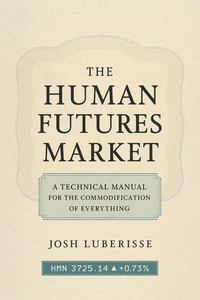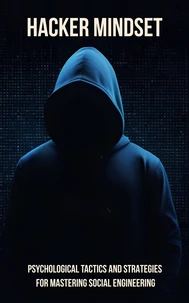Nouveauté
And the Abyss Gazes Back: A History of the Victor - Vanquished Synthesis
Par :Formats :
Disponible dans votre compte client Decitre ou Furet du Nord dès validation de votre commande. Le format ePub est :
- Compatible avec une lecture sur My Vivlio (smartphone, tablette, ordinateur)
- Compatible avec une lecture sur liseuses Vivlio
- Pour les liseuses autres que Vivlio, vous devez utiliser le logiciel Adobe Digital Edition. Non compatible avec la lecture sur les liseuses Kindle, Remarkable et Sony
 , qui est-ce ?
, qui est-ce ?Notre partenaire de plateforme de lecture numérique où vous retrouverez l'ensemble de vos ebooks gratuitement
Pour en savoir plus sur nos ebooks, consultez notre aide en ligne ici
- FormatePub
- ISBN8232392253
- EAN9798232392253
- Date de parution04/11/2025
- Protection num.pas de protection
- Infos supplémentairesepub
- ÉditeurHamza elmir
Résumé
In every great conflict, we assume victory means triumph-the vanquishing of an enemy, the end of a threat, the closing of a chapter. But what if victory is never complete? What if the act of defeating an adversary fundamentally transforms the victor, embedding within them the very qualities, structures, and ideologies they sought to destroy?And The Abyss Gazes Back explores a paradox that recurs throughout human history: conquerors are conquered by what they defeat.
From ancient empires to modern superpowers, from individual obsessions to civilizational transformations, this pattern repeats with unsettling consistency. The Mongol khans who became Chinese emperors. The Roman Empire spiritually conquered by the Christian cult it persecuted. The Crusaders who brought Islamic learning back to Europe. The Bolsheviks who reconstructed the Tsarist autocracy they murdered.
America's integration of Nazi scientists, Confederate mythology, and now, the mainstreaming of far-right extremism in the wake of defeating the Third Reich. This is not a book about morality or solutions. It is a historical chronicle, a dispassionate examination of how proximity, necessity, and incomplete victory create an inexorable gravitational pull between adversaries. Drawing on archival sources, intelligence records, and comparative analysis across centuries, it reveals the mechanisms by which the "abyss" of the enemy gazes back into the soul of the victor, reshaping them in ways they rarely comprehend until it's too late.
The book opens not with theory, but with a person: Michael Scheuer, founder of the CIA's Alec Station, the unit dedicated to tracking Osama bin Laden. For nearly a decade, Scheuer immersed himself in bin Laden's worldview, studying his writings, anticipating his moves, learning to think like him. When Navy SEALs raided bin Laden's compound in 2011, they found Scheuer's books on the shelves-bin Laden had been studying his hunter just as intensely.
But the truly disturbing twist came later: Scheuer, the man who dedicated his career to protecting America from terrorism, began advocating for a new American civil war, echoing conspiracy theories and anti-government rhetoric that would have been unthinkable for a CIA officer decades earlier. The hunter had gazed too long into the abyss. The abyss had gazed back. This opening case study establishes the book's central question: Why do those who fight monsters so often become monsters themselves?
From ancient empires to modern superpowers, from individual obsessions to civilizational transformations, this pattern repeats with unsettling consistency. The Mongol khans who became Chinese emperors. The Roman Empire spiritually conquered by the Christian cult it persecuted. The Crusaders who brought Islamic learning back to Europe. The Bolsheviks who reconstructed the Tsarist autocracy they murdered.
America's integration of Nazi scientists, Confederate mythology, and now, the mainstreaming of far-right extremism in the wake of defeating the Third Reich. This is not a book about morality or solutions. It is a historical chronicle, a dispassionate examination of how proximity, necessity, and incomplete victory create an inexorable gravitational pull between adversaries. Drawing on archival sources, intelligence records, and comparative analysis across centuries, it reveals the mechanisms by which the "abyss" of the enemy gazes back into the soul of the victor, reshaping them in ways they rarely comprehend until it's too late.
The book opens not with theory, but with a person: Michael Scheuer, founder of the CIA's Alec Station, the unit dedicated to tracking Osama bin Laden. For nearly a decade, Scheuer immersed himself in bin Laden's worldview, studying his writings, anticipating his moves, learning to think like him. When Navy SEALs raided bin Laden's compound in 2011, they found Scheuer's books on the shelves-bin Laden had been studying his hunter just as intensely.
But the truly disturbing twist came later: Scheuer, the man who dedicated his career to protecting America from terrorism, began advocating for a new American civil war, echoing conspiracy theories and anti-government rhetoric that would have been unthinkable for a CIA officer decades earlier. The hunter had gazed too long into the abyss. The abyss had gazed back. This opening case study establishes the book's central question: Why do those who fight monsters so often become monsters themselves?
In every great conflict, we assume victory means triumph-the vanquishing of an enemy, the end of a threat, the closing of a chapter. But what if victory is never complete? What if the act of defeating an adversary fundamentally transforms the victor, embedding within them the very qualities, structures, and ideologies they sought to destroy?And The Abyss Gazes Back explores a paradox that recurs throughout human history: conquerors are conquered by what they defeat.
From ancient empires to modern superpowers, from individual obsessions to civilizational transformations, this pattern repeats with unsettling consistency. The Mongol khans who became Chinese emperors. The Roman Empire spiritually conquered by the Christian cult it persecuted. The Crusaders who brought Islamic learning back to Europe. The Bolsheviks who reconstructed the Tsarist autocracy they murdered.
America's integration of Nazi scientists, Confederate mythology, and now, the mainstreaming of far-right extremism in the wake of defeating the Third Reich. This is not a book about morality or solutions. It is a historical chronicle, a dispassionate examination of how proximity, necessity, and incomplete victory create an inexorable gravitational pull between adversaries. Drawing on archival sources, intelligence records, and comparative analysis across centuries, it reveals the mechanisms by which the "abyss" of the enemy gazes back into the soul of the victor, reshaping them in ways they rarely comprehend until it's too late.
The book opens not with theory, but with a person: Michael Scheuer, founder of the CIA's Alec Station, the unit dedicated to tracking Osama bin Laden. For nearly a decade, Scheuer immersed himself in bin Laden's worldview, studying his writings, anticipating his moves, learning to think like him. When Navy SEALs raided bin Laden's compound in 2011, they found Scheuer's books on the shelves-bin Laden had been studying his hunter just as intensely.
But the truly disturbing twist came later: Scheuer, the man who dedicated his career to protecting America from terrorism, began advocating for a new American civil war, echoing conspiracy theories and anti-government rhetoric that would have been unthinkable for a CIA officer decades earlier. The hunter had gazed too long into the abyss. The abyss had gazed back. This opening case study establishes the book's central question: Why do those who fight monsters so often become monsters themselves?
From ancient empires to modern superpowers, from individual obsessions to civilizational transformations, this pattern repeats with unsettling consistency. The Mongol khans who became Chinese emperors. The Roman Empire spiritually conquered by the Christian cult it persecuted. The Crusaders who brought Islamic learning back to Europe. The Bolsheviks who reconstructed the Tsarist autocracy they murdered.
America's integration of Nazi scientists, Confederate mythology, and now, the mainstreaming of far-right extremism in the wake of defeating the Third Reich. This is not a book about morality or solutions. It is a historical chronicle, a dispassionate examination of how proximity, necessity, and incomplete victory create an inexorable gravitational pull between adversaries. Drawing on archival sources, intelligence records, and comparative analysis across centuries, it reveals the mechanisms by which the "abyss" of the enemy gazes back into the soul of the victor, reshaping them in ways they rarely comprehend until it's too late.
The book opens not with theory, but with a person: Michael Scheuer, founder of the CIA's Alec Station, the unit dedicated to tracking Osama bin Laden. For nearly a decade, Scheuer immersed himself in bin Laden's worldview, studying his writings, anticipating his moves, learning to think like him. When Navy SEALs raided bin Laden's compound in 2011, they found Scheuer's books on the shelves-bin Laden had been studying his hunter just as intensely.
But the truly disturbing twist came later: Scheuer, the man who dedicated his career to protecting America from terrorism, began advocating for a new American civil war, echoing conspiracy theories and anti-government rhetoric that would have been unthinkable for a CIA officer decades earlier. The hunter had gazed too long into the abyss. The abyss had gazed back. This opening case study establishes the book's central question: Why do those who fight monsters so often become monsters themselves?






















